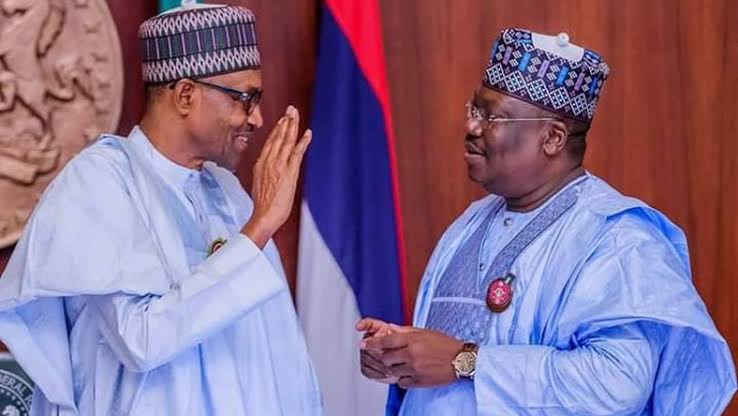President of the Senate, Ahmad Lawan, on Monday, explained why the Senate would approve the $29.96bn loan request of the President, Major General Muhammadu Buhari (retd).
Lawan, who stated this while addressing journalists in Abuja, explained that the Federal Government needed the loan to build critical infrastructure.
Buhari had on November 28 re-sent the $29.96bn 2016-2018 external borrowing plan to the Senate for its consideration and approval. The borrowing plan was rejected by the 8th Senate, which was headed by the immediate past President of the Senate, Dr Bukola Saraki.
The President’s demand came amidst warnings by the International Montery Fund and experts against Nigeria’s rising debts, which the Debt Management Office put at N25.7tn as of June 2019, with external borrowing accounting for about 32 per cent while the 68 per cent is domestic.
Commenting on the loan, Lawan said the Senate would approve it, but ensure its judicious utilisation.
The Senate President, who was responding to a question on whether the Senate would approve the loan or reject it like what happened three years ago, confirmed in the affirmative.
He said, “The question of whether we will pass (approve) the loan request of the executive arm of government, yes, we will pass it. If we don’t have money and you have projects to build them, how will you provide infrastructure that you need?
“But one thing is that, we are going to be critical that every cent that is borrowed is tied to a project.
“These are projects that will have spillover effects on the economy and we will undertake our oversight so well to ensure that such funds are properly, prudently, economically and transparently applied on those projects.”
Explaining why the request was rejected in 2016 by the Senate, Lawan said, “In 2016, the Senate did not pass the loan request of the executive at that time and the reason was because there were no sufficient details.
“I want to inform this gathering and indeed Nigerians that the letter conveying the loan request of the executive came with every possible detail and in fact we will ensure that we are getting the right information from the executive arm of government. So, the situation is not the same.
“In 2016, there was no submission of details. This time, I think the executive has learnt its lesson and the letter came with sufficient details.
“Nothing will really militate against the passage (of the bill) but we are going to be critical so that every borrowed amount is tied to a project.
“These are projects that will have spillover effects on the economy and we will undertake our oversight to ensure such money is effectively, efficiently prudently applied on those projects.”
The Senate President, had on October 23, cautioned the Federal Government on the continued reliance on borrowing to fund the infrastructure needs of the country.
Instead, he suggested a Public-Private Partnership option, to save the country from heavy indebtedness.
Lawan stated this at the opening session of a two -day public hearing organised by the National Assembly on the 2020 Federal Budget held at the federal parliament.
He had said, “We cannot continue to borrow to build our infrastructure, I belong to that school (of thought) that believes that, where we can have a PPP to build our infrastructure, we should do that.
“I feel that if we can build our road from Abuja to Kaduna or (to) Kano with private fund and they design a way to collect their money, let us do that.
“Other countries have done that and it worked. As long as we are not shortchanged, we have to look at it. If we have to borrow, we should borrow, where there is another opportunity we should explore that.”
Speaking on the hate speech bill controversy on Monday, Lawan said the Senate would kill the proposed legislation if the concensus opinion of Nigerians is that the law should not see the light of the day.
Lawan also said that the Senate would start working on the process for the review of the 1999 Constitution immediately the red chamber resumed plenary next year.
He said, “From early next year, our committee on the review of the constitution will start his job of constitution amendment.
“We have been very busy with the budget and so many other issues that we felt we should clear this one, and as soon as we come back, the committee on the review of the 1999 Constitution should start this job. We are going to do everything that will make governance better.”
Lawan said that apart from the six bills that had been passed, 185 bills had also gone through first reading in the 9th Senate, while 32 others had passed second reading and undergoing necessary further legislative processes at the relevant committees.
He said, “Some of the bills that will be accorded priority when we return from the Christmas and New Year break in January are the Petroleum Industry Bill, Electoral Reforms Amendment Bills and Amendment to the 1999 Constitution.”
